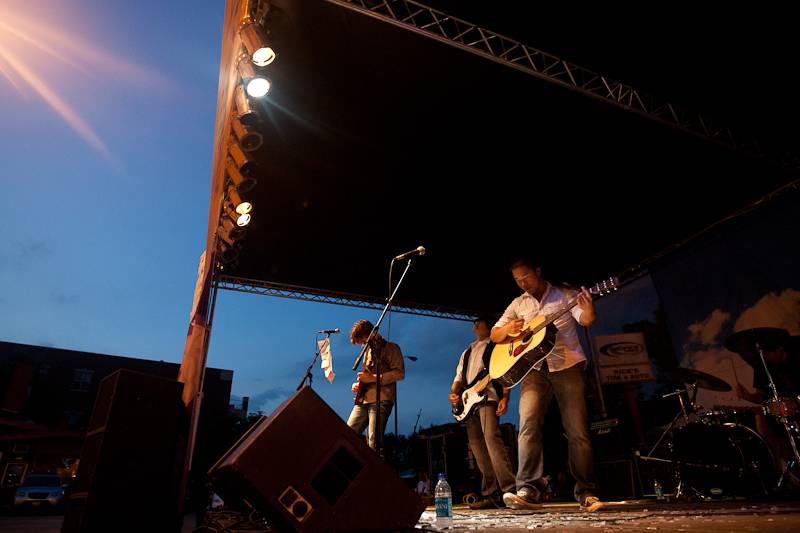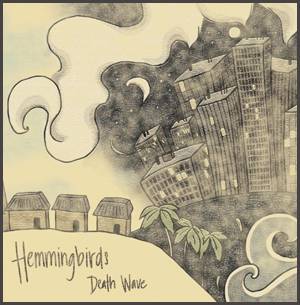T hough you might not recognize the name Hemmingbirds, you will probably recognize the Chicago band’s sound. Yoo Soo Kim, who was an integral part of now defunct C-U outfit Post Historic, is Hemminbirds’s primary songwriter. He started the band as a one-man studio project, but recently expanded it into a five-piece. Hemmingbird’s recently released debut album, Death Wave, is a kaleidoscope of sonically engaging pop rock songs. Even with today’s easily portable digital recording technology, it’s hard to believe it was all recorded in a basement. (You can check it out right now on the band’s website.)
hough you might not recognize the name Hemmingbirds, you will probably recognize the Chicago band’s sound. Yoo Soo Kim, who was an integral part of now defunct C-U outfit Post Historic, is Hemminbirds’s primary songwriter. He started the band as a one-man studio project, but recently expanded it into a five-piece. Hemmingbird’s recently released debut album, Death Wave, is a kaleidoscope of sonically engaging pop rock songs. Even with today’s easily portable digital recording technology, it’s hard to believe it was all recorded in a basement. (You can check it out right now on the band’s website.)
In advance of a show this Friday at Mike ‘n Molly’s, Kim answered a few questions that revealed the inspirational power of wine, his songwriting process and the benefits of playing music in a larger city.
How is the music in Hemmingbirds different from the things you were doing with Post Historic?
The music in Hemmingbirds is very much an extension of Post Historic. Eight of the ten songs in Death Wave were written or nearly finished while we were still together. Jesse (Johnson of Jet W. Lee) and I were the main creative forces in Post Historic, and it only made sense in the end that a lot of it ended up being like Post Historic. I debated at points to try to draw away from those songs and write an EP that deliberately sounded like a specific genre. But, ultimately, these were the songs that I had the most confidence in and had the most album potential.
Can you discuss the steps you went through in recording the new album? It appears you did everything yourself.
Over the past four years or so I acquired enough gear to have a makeshift studio so I decided to record my finished and nearly-finished songs at home and see what would go from there. The majority of the songs were mapped out in my head and it was only a matter of me performing all the instruments (vocals, guitar, bass, piano, viola, percussion) except for drums. Drums and I have a love-hate relationship—that is why Zach Benkowski recorded drums on seven out of the ten tracks.
The entire recording process was somewhat complicated because I didn’t have a control room or another helping hand and there were some days where I would run from my laptop to the drum kit to track some takes. However, recording alone at my own studio gave me the benefit of having a lot of time with messing around with sounds and arrangements.
Come mixing, I, at that time, didn’t have a decent pair of studio monitors so my entire mixing process was either through headphones or in my car, since that had actual subwoofers. This was fairly time consuming, so my usual plan of attack was to drink half a bottle of wine and mix the night away. Is it alcoholism if I’m productive?
This band originally started as a solo project, but has since expanded to a five piece. Can you talk about how that came about? Was it an intentional change or a fairly organic process when you went to play these songs live?
This was completely intentional. I wanted to make an album first and then flesh it out with a five-piece band. The advantage was that I knew what I wanted and how everything should be structured. A disadvantage was that it didn’t translate as perfectly as I had wanted because some songs require more than five parts and some less. Another disadvantage was that the band that I got together was talented enough to come up with some parts that were better than mine. It’s not necessarily a “disadvantage,” but I wish that those parts were on the album and have the songs feel the way they do now after they’ve been more broken in. But the album is what it is, and I still am proud of it.
On your MySpace page you list that you have been compared to Arcade Fire, Ted Leo and Fleet Foxes. Do you find any of those apt comparisons? Is there any band that you particularly would like to model yourself after?
I can see the comparison to Arcade Fire and I’m very influenced by them. Hopefully it’s not to the point that I’m ripping them off…don’t call me out, please! As for Ted Leo, I guess I can see it because I have a lot of punk rock roots that undoubtedly shape my songwriting. And Fleet Foxes is probably because we have sections of four-part harmonies. I’ve also heard us compared to Death Cab, Neil Young, and the Yeah Yeah Yeahs, so I really don’t know who we sound like.
I tried to shape Death Wave to Radiohead’s The Bends. Not necessarily so that it would be straight-up anthem, guitar rock, but rather to have a very, very strong pop and emotional sensibility and then added layers and weirdness afterward. I also hate to compare myself to Radiohead just because they are my favorite band and I don’t want to rip off a sound. But really, who doesn’t want to be as successful and respected as Radiohead?
 How do you approach songwriting? Do you seek out the sort of “soaring pop” that you play or is that just what comes naturally when you write?
How do you approach songwriting? Do you seek out the sort of “soaring pop” that you play or is that just what comes naturally when you write?
I would agree that I always look for a strong melody or hook in my songs (“soaring pop”), and if I don’t have that, I don’t feel that it’s worth keeping. I’m still pretty fascinated by noise though and it you can sense parts of that in the album. Actually, about five years ago I was writing noise, prog rock songs. But that…just didn’t work out. For another day, I suppose.
Really though, I don’t have a go-to songwriting process. A bulk of the songs from this album though have been from Post Historic or me playing for a couple hours while I recorded it. I’d then pick the ideas I liked best and then carved them into four-minute songs. That seems to be my favorite process because then I’m capturing an essence that I liked the best and that’s endured multiple listens.
You’re playing with Jet W. Lee and you were often featured in Jesse W. Johnson’s solo disc Home to Roast. Can you talk about how your relationship has developed since the beginning of Post Historic?
So the common love story goes, Jesse and I essentially met as complete strangers. He sent an email out to a mailing list asking if anyone wanted to form a band and I replied. We then both spent our college years figuring out music, the scene, and the industry. At its core, Post Historic was our friendship and our shared love for music. I’m extremely proud of everything we did in Post Historic and even though we put out one EP, we probably had a catalog of over 50 songs between the two of us. We’re still good friends and now that Jet W Lee resides in Chicago (with their claimed dual citizenship in Champaign), we hang out more often. As for music, once my studio is complete, I believe that we are planning on making some sweet, sweet music there. Yes, “music.”
You used to be in a Champaign band, what’s the difference between Champaign and Chicago in terms of the music scene? Do you feel like you have more options in Chicago? What do you miss most/least about playing in Champaign?
Because Chicago is a much larger city, there are a lot more options in that music scene compared to Champaign’s. It’s very exciting after playing in Champaign because there is so much going on and so many opportunities to jump on. There are so many people and groups trying to do their own thing and I’m constantly finding music and art that I think is awesome. However, in that same regard, it’s also much more difficult to gain some sort of position in the local scene. But, I say that non-competitively. Ultimately, both scenes have their advantages and disadvantages, and I’m happy and excited to be a part of Chicago’s music scene and am still glad that I’m able to be a part of C-U’s scene. Best of both worlds. Schawing.
As for Champaign, I definitely miss the number of connections I’ve established in C-U’s scene. I spent four years developing relationships within the scene and by my senior year, it really felt nice knowing a music scene and being a contributor of it. It was also awesome being a sound engineer at the Canopy Club and seeing a lot of local and national bands go in and out of there. Then when I moved to Chicago, I really didn’t know anyone and I had to start all over again.
The thing I miss the least is the city’s size and that it’s a college town. I’m a Chicagoan at heart and large cities are my calling. When I say C-U is a college town, I mean it inoffensively and I say that because I was a student there so that was the experience that I absorbed the most. This position also affected our place within the music scene. The bulk of our draw was from our friends and college students. Sadly, the older we were getting, the smaller our draw was becoming. As much as I loved Champaign, students were graduating and moving out of C-U and it was tough to say what would happen the longer I played in a band there.
What are your future plans with this project?
This is my main project and I plan to do whatever I can with this band. Currently we’re planning more shows and are in talks for a remix of “Mellow Gold Haze” and a music video of “Death Wave/Color Swirls.” And definitely more shows in the C-U area. Hopefully those form soon.
Hemmingbirds play this Friday (September 10) at Mike ‘n Molly’s with Jet W. Lee and the Bears of Blue River. ($5, 8 p.m.)








